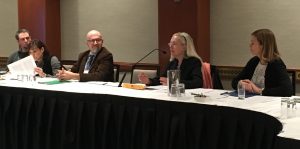Our department is gearing up for its first search in years, and my first search as chair. Given how long we’ve waited, and how tenuous our college’s budget still is, there’s a lot of both excitement and anxiety about making this search work. We’re searching in what is—comparatively—a competitive subfield, and to be honest we’re not necessarily a stereotypically desirable school. We’re located in a semi-rural location, our library isn’t comparable to most facilities graduate students are used to, and faculty here carry a 4-4 teaching load that is usually divided each semester into two sections of first year writing, a sophomore-level survey, and an upper-division course in a specialty. Don’t get me wrong—there are good people here and our department is generally happy and forward thinking, and the students are deserving of the best teaching we can provide. But I’ve also heard stories of other departments accelerating searches beyond the traditional timeline, abandoning MLA convention interviews, and the like in order to best position themselves. How do I address our need to have a successful search while at the same time doing right by candidates? And perhaps even more simply, how do searches work in this day of Zoom/Skype, tough budgets, and the like? As I said, it’s been a long time.—Dr. Right
Dear Dr. Right,
Before I address the specifics of your question, I’d like to direct your (and my readers’) attention to the MLA Guidelines for Search Committees and Job Seekers. These guidelines are the industry standard, and to my mind an ethical guide as well, in terms of what hiring departments should do when searching for candidates. If you follow them, you’ll have a successful — and ethical — search.
I too have heard stories of departments scooping up candidates out of the hiring timetable. Personally, I think this is deplorable. These institutions present candidates with an ultimatum: come to us or risk getting nothing. They can do this and get away with it because the job market is so tight that candidates are highly motivated to take the offer in hand. This strikes me as exploitive, as well as breaking MLA guidelines, which are very clear on this: “No candidate should be required before 31 January to give a final answer to an offer of a position without tenure for the following academic year, however early an offer is tendered.”
The tightness of the market works to your advantage as well, though. Institutions with high teaching loads are able to attract excellent candidates. More to point (and to your benefit), there are PhD graduates who love teaching and would prefer a job with more teaching and less research. I know of several PhDs who looked specifically for community college jobs, since they had attended two-year institutions themselves, and felt motivated by their mission. My advice to you is to be straightforward with candidates without apologizing for who you are. In your interviews with candidates, start with questions about teaching and working with students. You could ask them to submit syllabi for composition classes as well as courses more in their area of study, which will make clear what their teaching responsibilities will be.
In these days of shrinking budgets, candidates are more likely to request a remote interview rather than one at the MLA. That might work well for you too, since it allows a little more flexibility for your search committee to schedule interviews, plus your department can also save money on travel. I’d suggest a few ground rules for Zoom/Skype interviewing. I’d recommend that the interviewers all be in the same place, if possible. In my experience, in-person debriefings are essential after each interview and easier than faculty talking over Zoom or Skype. You don’t need to keep to the punishing schedule of MLA interviews, but I would encourage you to schedule them over the course of a few days, so all the candidates are fresh in your mind. And keep your number of interviewees the same as you would if you were at the MLA — there’s a temptation to fill out the list since you have more flexibility in scheduling.
Of course, the rubber really hits the road at the campus visit. While you are not allowed to ask personal questions, most likely candidates will volunteer information that will be of help to figure out whether they’re really interested in the job (although “fit” is highly subjective and often affected by prejudices of all kinds). Again you should make clear the strengths of your institution, as well as the reality of the workload. If you’re lucky, the person you choose will fall in love with the area, the students, and the department.

